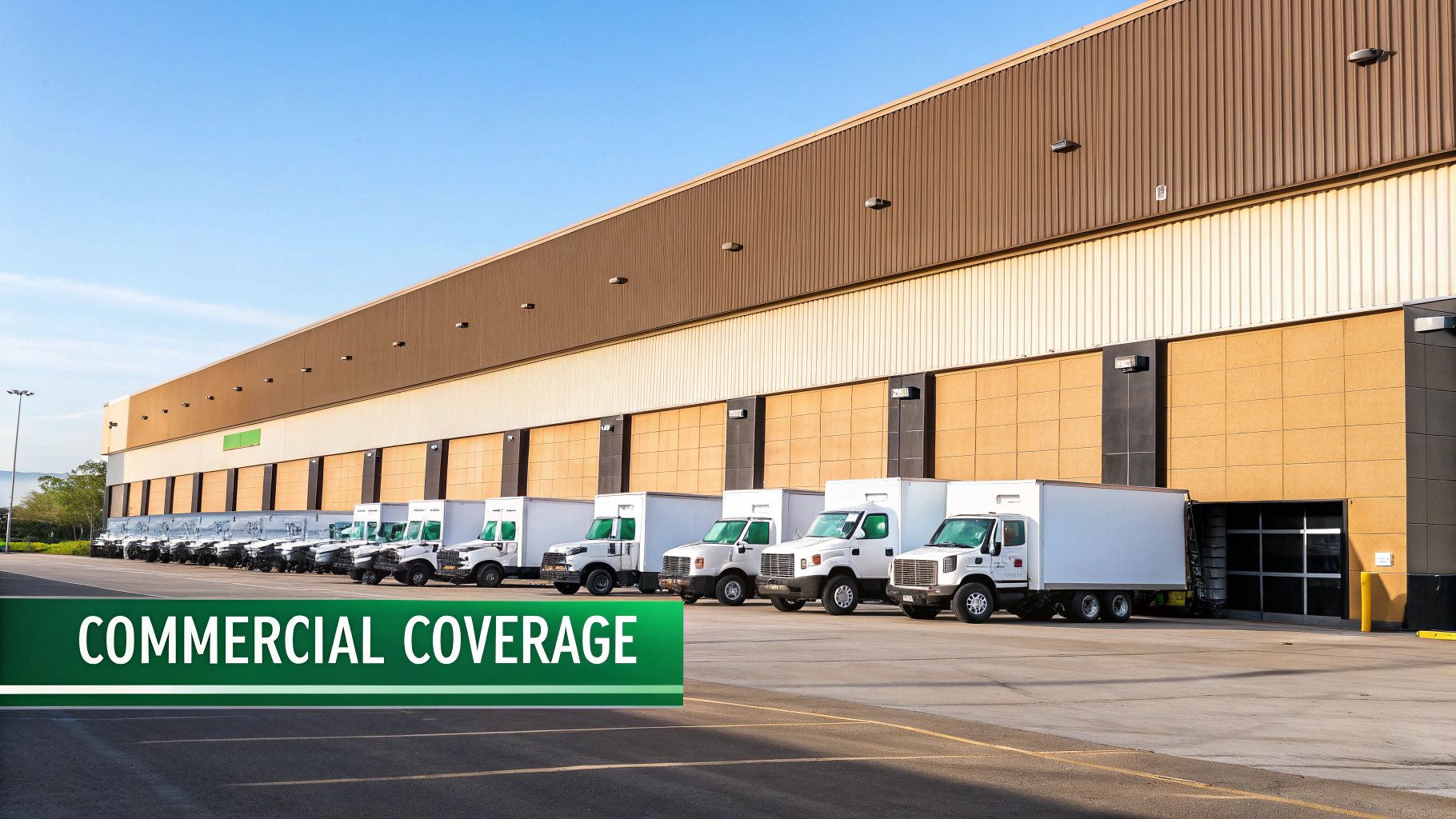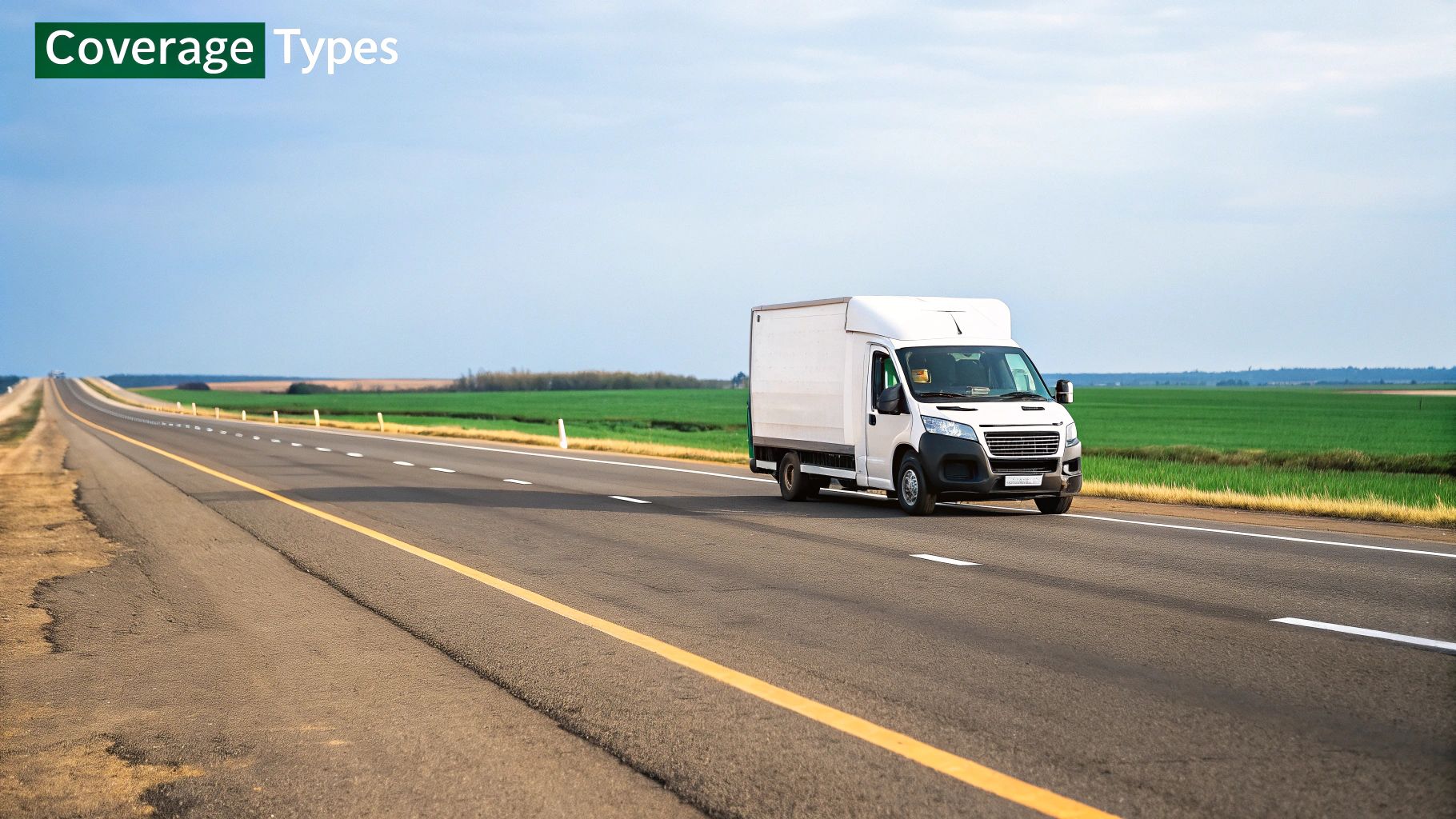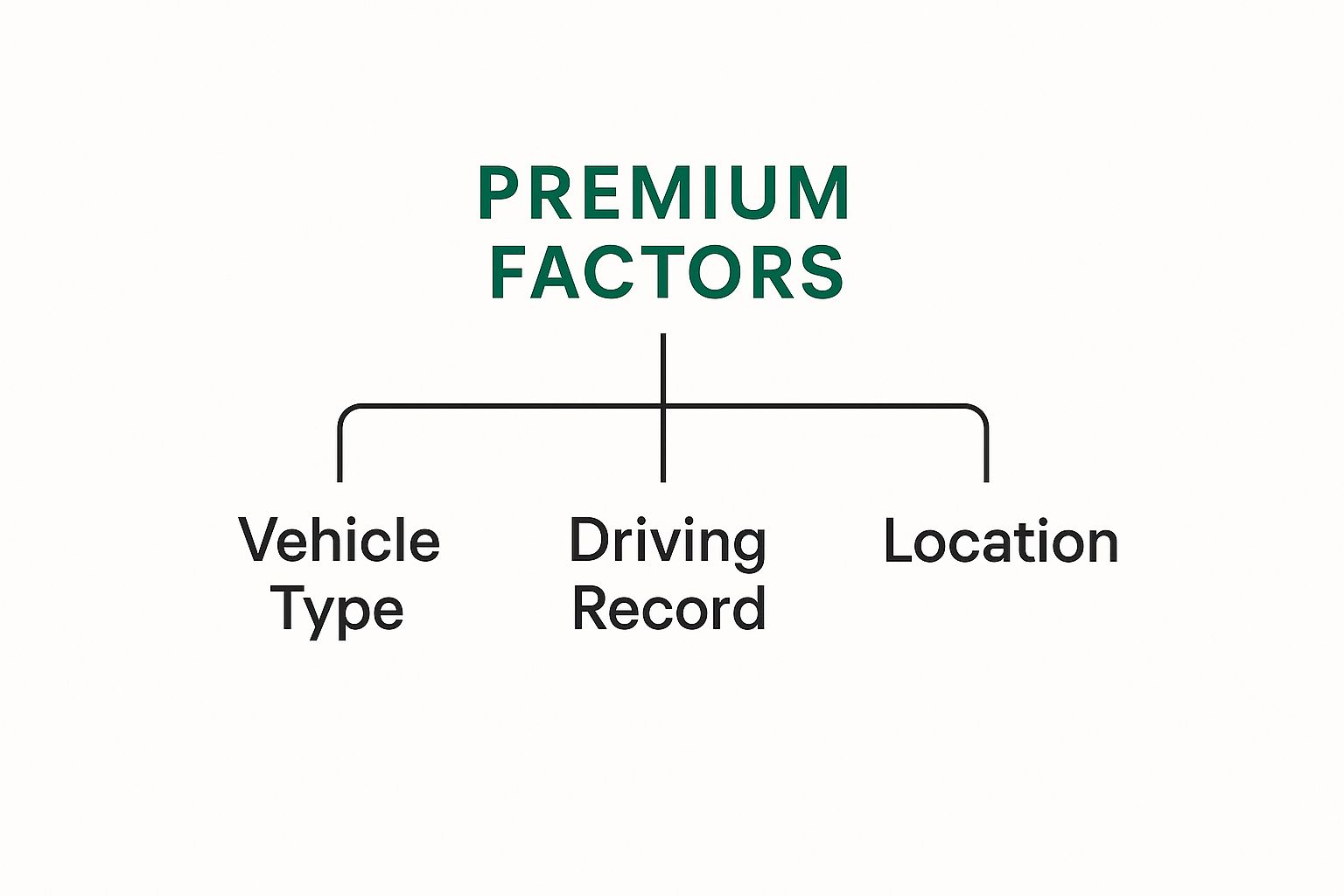At its core, commercial vehicle insurance is a specialized policy designed to protect any vehicle you use for business. This is a critical distinction because a standard personal auto policy will not cover accidents that occur while a vehicle is being used for work.
Understanding Your Business Vehicle's Armor
Think about the difference between a professional contractor's toolkit and the basic one you might have at home. Both probably have a hammer, but the contractor's set is built for the higher risks and heavy-duty demands of a job site. Commercial vehicle insurance is that professional-grade toolkit for your business vehicles.
This isn't just for massive semi-trucks or fleets of construction equipment. This specialized protection is essential for a surprising range of business activities. If you rely on any vehicle to run your business, your personal policy almost certainly leaves you with a major coverage gap.
Who Is This Insurance For?
Many business owners mistakenly assume their personal car insurance is sufficient. The reality is, if your vehicle is used for work-related tasks that go beyond a simple commute to the office, you need commercial coverage. This applies to more situations than you might think.
- Service Professionals: Think of a plumber's van, an electrician's truck, or a landscaper's pickup filled with tools and equipment heading to job sites.
- Delivery and Transport: This includes a florist's van delivering arrangements, a food truck traveling to events, or a restaurant car making catering drop-offs.
- Client-Facing Roles: A real estate agent driving clients to view properties or a consultant traveling to business meetings are common examples.
- Rented or Employee Vehicles: Even if an employee runs a company errand in their own car, your business could be held liable in an accident.
The rule of thumb is simple: if a vehicle is an asset used to generate revenue or perform business operations, it needs commercial insurance. Relying on personal coverage is a huge financial gamble that could put your entire business at risk after just one accident.
Getting a handle on what commercial vehicle insurance covers is the first step. It's also wise to be aware of potential challenges within the insurance industry. This knowledge helps you navigate your policy with more confidence, ensuring you get the right protection without any unexpected issues.
Personal vs Commercial Auto Insurance At a Glance
To make it even clearer, let's break down the fundamental differences between a standard personal policy and a commercial one. This quick comparison should help you instantly identify which type of coverage you need.
| Feature | Personal Auto Insurance | Commercial Vehicle Insurance |
|---|---|---|
| Primary Use | Commuting, errands, social trips. | Transporting goods, people, or equipment for work. |
| Coverage Limits | Lower liability limits, suitable for personal risk. | Higher liability limits to protect business assets. |
| Vehicle Types | Standard cars, SUVs, and personal trucks. | Trucks, vans, box trucks, specialty vehicles. |
| Who's Covered | Policyholder and listed family members. | Owner, employees, and anyone permitted to drive for the business. |
| Cost | Generally lower due to less risk. | Higher premiums reflecting greater liability and vehicle use. |
Ultimately, choosing the right policy comes down to how the vehicle is used. If it's a tool for your trade, a personal policy simply won't cut it when you need it most.
Who Actually Needs Commercial Vehicle Insurance?
It’s a common misconception, and a risky one at that. Many business owners assume their personal car insurance has them covered when they use their vehicle for work. The reality is, the line between personal and business use is crystal clear to an insurance company.
The moment your vehicle becomes a tool of your trade—doing anything more than just getting you to and from a single workplace—your personal policy is likely void. If you get into an accident while on the job, you could face a denied claim, leaving your business to foot the entire bill.
Common Scenarios That Require Commercial Coverage
Let's look at some real-world situations where business owners often get tripped up. You almost certainly need a commercial auto policy if a vehicle is used for work-related tasks like these:
- Transporting Goods or Equipment: Think of a caterer delivering food, a photographer hauling expensive gear to a shoot, or even a baker carefully transporting a wedding cake. It all counts.
- Traveling Between Job Sites: This isn't just about long-haul trucking. It includes a consultant driving to multiple client offices, a real estate agent showing properties all day, or a mobile pet groomer making house calls.
- Carrying Passengers for a Fee: If you’re transporting people as a service, like an airport shuttle or a local tour van, commercial coverage is an absolute must.
- Letting Employees Use Their Own Cars for Errands: Ever send an employee to the post office or to pick up supplies in their personal car? If they cause an accident, your business is on the hook. This is precisely why Hired and Non-Owned Auto Insurance exists—to cover that specific gap.
The question you need to ask yourself is simple: "Am I using this vehicle to make money or advance my business?" If the answer is yes, relying on personal insurance is a massive gamble. One at-fault accident could put everything you've built in jeopardy.
Legal Mandates and Financial Responsibility
It's not just about avoiding a denied claim; it's often about the law. Many states require any vehicle registered to a business to carry commercial auto insurance. This isn't just a local trend, either. In 2023, compulsory insurance segments made up a huge chunk of the global market, showing a worldwide push for more financial accountability from businesses.
Understanding the legal obligations for transport businesses makes it clear why this coverage is non-negotiable. These regulations are designed to protect the public. They ensure that if your business causes an accident, there's a policy in place with enough funds to cover the injuries and property damage.
This kind of protection is a cornerstone of running a legitimate, financially sound company. You can learn more about how these policies fit into a larger safety net in our guide on what is commercial insurance.
What’s Actually Inside Your Commercial Auto Policy?
A commercial auto policy isn't some monolithic, one-size-fits-all product. It's really a package of individual coverages, with each one designed to shield your business from a specific kind of financial hit. Getting a handle on these different pieces is the only way to know if you're truly protected on the road.
Think of it like building a custom toolbox. You start with the essentials—the hammer and screwdriver—but you add specialized tools based on the jobs you do. Let's open up the box and see what's inside.
The Foundation: Liability Coverage
The absolute, non-negotiable starting point for any commercial auto policy is liability coverage. This is the part that kicks in when you or your driver are at fault in an accident. Critically, it doesn't pay to fix your vehicle; it pays for the damage your vehicle caused to other people or their property.
This essential coverage is almost always split into two key areas:
- Bodily Injury Liability: If people are hurt in an accident your driver caused, this covers their medical bills, lost income, and the legal fees if you get sued.
- Property Damage Liability: This pays to repair or replace whatever your driver hit, whether it's another car, a storefront, or a client's fence.
One major accident can easily lead to claims in the hundreds of thousands, if not millions, of dollars. If your liability limits are too low, your business assets—from your bank accounts to your equipment—could be on the line to pay the difference.
Protecting Your Fleet: Physical Damage Coverage
While liability takes care of everyone else, physical damage coverage is what protects your own business vehicles. It’s the part of the policy that gets your truck, van, or car repaired and back on the road so you can keep operating. This coverage is usually optional, unless your vehicle is financed or leased, in which case the lender will require it.
Just like liability, physical damage is a two-part system:
- Collision Coverage: This pays to fix your vehicle when it collides with something else, like another car, or even a stationary object like a guardrail.
- Comprehensive Coverage: This handles just about everything else. Think of it as your protection against theft, vandalism, fire, hail, floods, or hitting a deer.
It's also worth noting that policies have fine print. For example, understanding the insurance appraisal clause is a key piece of knowledge that can help you get a fair settlement if you and the insurer disagree on your vehicle's value after a total loss.
Filling the Gaps: Hired and Non-Owned Auto Coverage
Here’s a scenario that catches a lot of business owners by surprise: What happens when you send an employee to the bank using their personal car? Or when you rent a truck for a big delivery? Your standard commercial policy probably won't cover accidents in these situations.
This is precisely where Hired and Non-Owned Auto (HNOA) coverage comes in. It’s an endorsement that extends your company's liability protection to vehicles your business uses but doesn’t actually own. This is a must-have for any business where employees might drive their own cars for work, even for a quick errand. The lines can get blurry, so it's smart to compare commercial vs. personal auto insurance to fully grasp the differences.
To make it even clearer, here's a simple breakdown of the most common coverages you'll find in a standard policy.
Standard Commercial Auto Insurance Coverages
| Coverage Type | What It Protects | Example Scenario |
|---|---|---|
| Bodily Injury Liability | Others' medical costs and legal fees if they are injured by your vehicle. | Your driver runs a red light and hits another car, injuring the other driver. |
| Property Damage Liability | Repair or replacement costs for another person's property damaged by your vehicle. | Your delivery van backs into a client's brick mailbox, destroying it. |
| Collision Coverage | Repair costs for your own vehicle after an accident where it collides with an object. | Your work truck slides on ice and hits a telephone pole. |
| Comprehensive Coverage | Damage to your own vehicle from non-collision events like theft, fire, or weather. | A hailstorm dents the roof and hood of your company car while it's parked. |
| Hired & Non-Owned Auto | Liability protection for vehicles your business uses but doesn't own. | An employee gets into an accident while driving their own car to a client meeting. |
Ultimately, piecing together the right policy means looking at your specific operations and choosing the coverages that match your real-world risks.
What Drives Your Commercial Insurance Costs
When it comes to your commercial auto premium, there's no magic number. Insurers are essentially risk detectives, looking at every detail of your business to figure out how likely you are to file a claim. That final price tag is a direct reflection of your company’s unique risk profile.
Think about it. Insuring a local flower delivery van is a world away from covering a long-haul truck that moves hazardous materials across the country. Every single variable, from the vehicle itself to its daily route, helps an underwriter build a complete picture of your potential risk.
Knowing what they look for is your first step to getting a handle on your costs.
Your Vehicle's Profile
It probably comes as no surprise that the vehicle itself is a huge factor. A heavy dump truck or a big rig with a refrigerated trailer carries far more risk than a small sedan a salesperson drives to client meetings. They can cause more damage in a crash and are much more expensive to fix or replace.
Insurers will look closely at a few key things:
- Gross Vehicle Weight (GVW): Simply put, heavier vehicles can cause more destruction, which means higher potential liability claims.
- Cost and Age: A brand-new, top-of-the-line truck costs a lot more to replace than an older, high-mileage van. This directly affects your physical damage coverage premiums.
- Intended Use: Is your truck just hauling cargo, or is it outfitted with a specialized boom lift or a tow rig? That special equipment introduces unique risks that will influence your rate.
Your Drivers and Operations
What you’re driving is only half the story. How you use it and who is behind the wheel are just as crucial in the eyes of an insurer.
An insurer always wants to know your "radius of operation"—that's the distance your vehicles typically travel from your home base. A local contractor who never leaves a 50-mile radius is seen as a much lower risk than a trucking company whose fleet crosses state lines every week.
On top of that, your drivers’ records will be put under a microscope. An entire team with spotless Motor Vehicle Records (MVRs) will land you a much better rate than a company hiring drivers with a history of accidents or traffic violations.
This is all playing out in a tough market. The commercial auto insurance industry has been on a rollercoaster for years, thanks to everything from driver shortages to skyrocketing repair costs and massive jury awards in liability lawsuits, often called "nuclear verdicts."
By understanding how these pieces fit together, you can start looking for ways to improve your risk profile. Our detailed guide offers more insight into controlling your business auto insurance cost. Taking a proactive stance on safety and managing your risk is always the best way to earn the most competitive rates.
How to Choose the Right Policy and Save Money
Finding the right commercial vehicle insurance isn't just about ticking a box. It's about getting the right protection for your business without draining your budget. A smart approach here can make a real difference, freeing up money you can put right back into growing your company. The secret is to get ahead of it instead of just reacting when the bill comes.
A great place to start is simply taking a fresh look at your needs on a regular basis. Businesses change. You might add new trucks, expand your service area, or bring on more drivers. Don't just wait for the renewal notice to land on your desk; an annual review ensures your policy actually fits what you're doing today.
Practical Ways to Lower Your Premiums
One of the most powerful things you can do is implement a formal driver safety program. Insurance companies love to see that you're actively managing your risk. This could be anything from regular training sessions and a strict no-phones-while-driving rule to rewarding your team for staying accident-free. Clean driving records are the best proof you can offer an insurer that you’re a safe bet.
A common tactic for lowering your monthly premium is to choose a higher deductible. Yes, this means you'll pay more out of your own pocket if you need to file a claim, but the savings over the year can be significant—especially if your business has a great safety track record and rarely makes claims.
Here are a few other proven ways to get immediate and long-term savings:
- Bundle Your Policies: Most insurers give you a serious discount if you combine your commercial auto policy with other coverage, like general liability or a Business Owner's Policy (BOP). It’s worth exploring the different commercial insurance types to see what bundles make sense for your operation.
- Invest in Safety Tech: Putting telematics devices, dash cams, and anti-theft systems in your vehicles can often score you a discount. This technology gives insurers hard data showing you're serious about safe driving and keeping your vehicles secure.
- Pay Annually: If your cash flow can handle it, paying your entire premium for the year at once often gets rid of the installment fees that come with monthly payments.
At the end of the day, nothing beats working with an expert. Partnering with an insurance specialist who gets your industry inside and out can uncover savings you’d never find on your own. They know how to compare quotes beyond just the price tag and can help you build a policy that gives you rock-solid protection without the fluff.
Frequently Asked Questions
Even with all the basics covered, you probably still have a few questions about commercial vehicle insurance. That's completely normal. Getting straightforward answers is the best way to feel confident you're making the right call to protect your business.
Let's dive into some of the most common questions we hear from business owners just like you.
What Is The Difference Between Commercial And Business Auto Insurance
It's easy to get tripped up by the terminology here. You'll hear "commercial auto" and "business auto" insurance used all the time, and honestly, they usually mean the same thing. Both policies are designed to cover vehicles used for work.
If there's any distinction, it's usually a subtle one made by the insurance carriers themselves. "Commercial auto" is the broader term, covering everything from a contractor's heavy-duty truck to a fleet of delivery vans. Some insurers might use "business auto" to refer more specifically to policies for lower-risk vehicles, like a real estate agent's car or a consultant's sedan.
The name on the policy is far less important than what's written inside it. Your focus should always be on making sure the coverage details line up perfectly with your company's vehicles, operations, and risks—no matter what the policy is called.
Does My Personal Auto Insurance Cover Any Business Use
This is a huge one, and getting it wrong can have serious financial consequences. Your personal auto policy might cover your commute to and from your one work location, but that's typically where the coverage stops. It almost certainly does not cover actual business operations.
Thinking your personal policy has you covered for work is a gamble you don't want to take. If you're using your vehicle for any of the following, your personal insurance likely won't respond to a claim:
- Delivering products or food to customers
- Transporting paying clients (like a rideshare service)
- Hauling tools, equipment, or supplies to different job sites
- Letting an employee run company errands in your car
If you have an accident while doing any of these things, your personal insurer can—and probably will—deny the claim. That would leave you personally on the hook for all the repair costs, medical bills, and any lawsuits that follow. A denied claim could even have a domino effect on other coverages, like your protection for business interruption insurance cost.
How Can Telematics Help Lower My Premium
Telematics is a fantastic tool for demonstrating your commitment to safe driving, and it can lead to some pretty significant savings on your premium. Think of it as a fitness tracker for your vehicles.
These systems use GPS and other sensors to gather data on how your vehicles are actually being driven. By installing a telematics device, you can give your insurer a clear, data-backed picture of your fleet's behavior—things like average speed, hard braking events, rapid acceleration, and miles driven.
Insurers love this kind of transparency because it removes the guesswork from assessing your risk. When you can prove your drivers are safe, you're often rewarded with lower premiums.
Sorting through the details of commercial insurance can feel overwhelming, but you don't have to figure it all out on your own. The experts at Wexford Insurance Solutions are here to give you clear answers and help build a policy that fits your business perfectly, so you're fully protected without overpaying. Visit us at https://www.wexfordis.com to get started.
 What is Commercial Umbrella Insurance? Protect Your Business Now
What is Commercial Umbrella Insurance? Protect Your Business Now Cyber Liability Insurance for Small Business Explained
Cyber Liability Insurance for Small Business Explained









